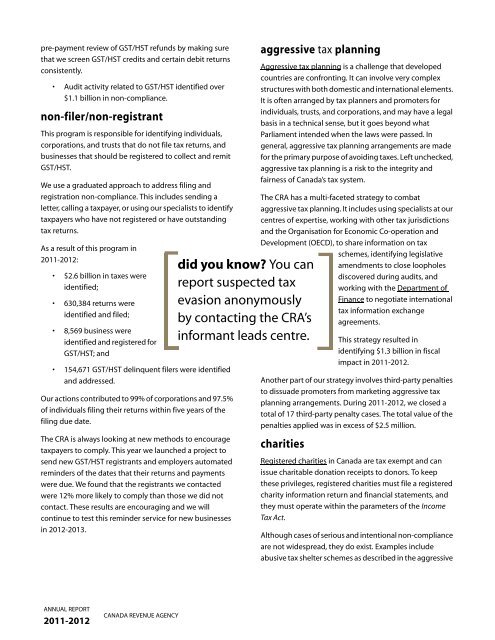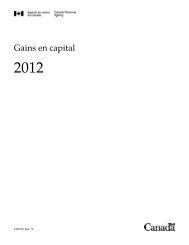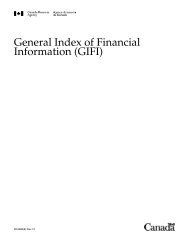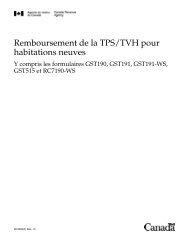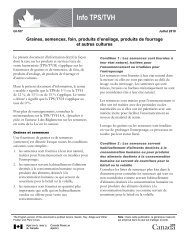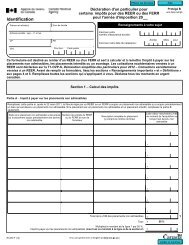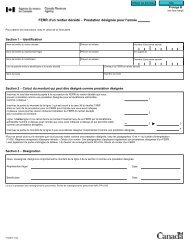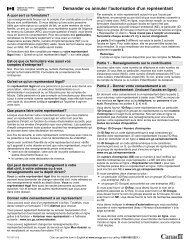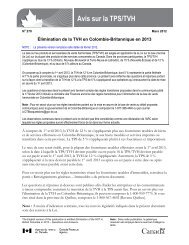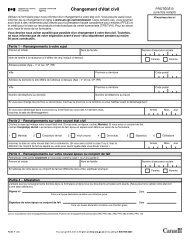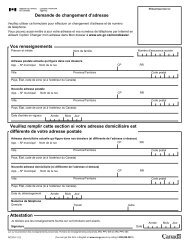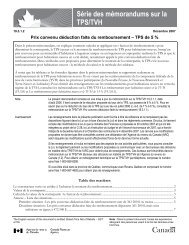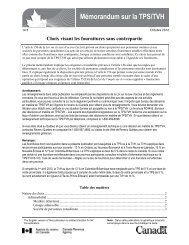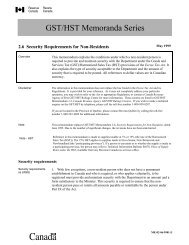CRA Annual Report to Parliament 2011-2012 (PDF - Agence du ...
CRA Annual Report to Parliament 2011-2012 (PDF - Agence du ...
CRA Annual Report to Parliament 2011-2012 (PDF - Agence du ...
You also want an ePaper? Increase the reach of your titles
YUMPU automatically turns print PDFs into web optimized ePapers that Google loves.
pre-payment review of GST/HST refunds by making sure<br />
that we screen GST/HST credits and certain debit returns<br />
consistently.<br />
Audit activity related <strong>to</strong> GST/HST identified over<br />
$1.1 billion in non-compliance.<br />
non-filer/non-registrant<br />
This program is responsible for identifying indivi<strong>du</strong>als,<br />
corporations, and trusts that do not file tax returns, and<br />
businesses that should be registered <strong>to</strong> collect and remit<br />
GST/HST.<br />
We use a gra<strong>du</strong>ated approach <strong>to</strong> address filing and<br />
registration non-compliance. This includes sending a<br />
letter, calling a taxpayer, or using our specialists <strong>to</strong> identify<br />
taxpayers who have not registered or have outstanding<br />
tax returns.<br />
As a result of this program in<br />
<strong>2011</strong>-<strong>2012</strong>:<br />
$2.6 billion in taxes were<br />
identified;<br />
630,384 returns were<br />
identified and filed;<br />
8,569 business were<br />
identified and registered for<br />
GST/HST; and<br />
154,671 GST/HST delinquent filers were identified<br />
and addressed.<br />
Our actions contributed <strong>to</strong> 99% of corporations and 97.5%<br />
of indivi<strong>du</strong>als filing their returns within five years of the<br />
filing <strong>du</strong>e date.<br />
The <strong>CRA</strong> is always looking at new methods <strong>to</strong> encourage<br />
taxpayers <strong>to</strong> comply. This year we launched a project <strong>to</strong><br />
send new GST/HST registrants and employers au<strong>to</strong>mated<br />
reminders of the dates that their returns and payments<br />
were <strong>du</strong>e. We found that the registrants we contacted<br />
were 12% more likely <strong>to</strong> comply than those we did not<br />
contact. These results are encouraging and we will<br />
continue <strong>to</strong> test this reminder service for new businesses<br />
in <strong>2012</strong>-2013.<br />
ANNUAL REPORT<br />
<strong>2011</strong>-<strong>2012</strong><br />
CANADA REVENUE AGENCY<br />
did you know? You can<br />
report suspected tax<br />
evasion anonymously<br />
by contacting the <strong>CRA</strong>’s<br />
informant leads centre.<br />
aggressive tax planning<br />
Aggressive tax planning is a challenge that developed<br />
countries are confronting. It can involve very complex<br />
structures with both domestic and international elements.<br />
It is often arranged by tax planners and promoters for<br />
indivi<strong>du</strong>als, trusts, and corporations, and may have a legal<br />
basis in a technical sense, but it goes beyond what<br />
<strong>Parliament</strong> intended when the laws were passed. In<br />
general, aggressive tax planning arrangements are made<br />
for the primary purpose of avoiding taxes. Left unchecked,<br />
aggressive tax planning is a risk <strong>to</strong> the integrity and<br />
fairness of Canada’s tax system.<br />
The <strong>CRA</strong> has a multi-faceted strategy <strong>to</strong> combat<br />
aggressive tax planning. It includes using specialists at our<br />
centres of expertise, working with other tax jurisdictions<br />
and the Organisation for Economic Co-operation and<br />
Development (OECD), <strong>to</strong> share information on tax<br />
schemes, identifying legislative<br />
amendments <strong>to</strong> close loopholes<br />
discovered <strong>du</strong>ring audits, and<br />
working with the Department of<br />
Finance <strong>to</strong> negotiate international<br />
tax information exchange<br />
agreements.<br />
This strategy resulted in<br />
identifying $1.3 billion in fiscal<br />
impact in <strong>2011</strong>-<strong>2012</strong>.<br />
Another part of our strategy involves third-party penalties<br />
<strong>to</strong> dissuade promoters from marketing aggressive tax<br />
planning arrangements. During <strong>2011</strong>-<strong>2012</strong>, we closed a<br />
<strong>to</strong>tal of 17 third-party penalty cases. The <strong>to</strong>tal value of the<br />
penalties applied was in excess of $2.5 million.<br />
charities<br />
Registered charities in Canada are tax exempt and can<br />
issue charitable donation receipts <strong>to</strong> donors. To keep<br />
these privileges, registered charities must file a registered<br />
charity information return and financial statements, and<br />
they must operate within the parameters of the Income<br />
Tax Act.<br />
Although cases of serious and intentional non-compliance<br />
are not widespread, they do exist. Examples include<br />
abusive tax shelter schemes as described in the aggressive


